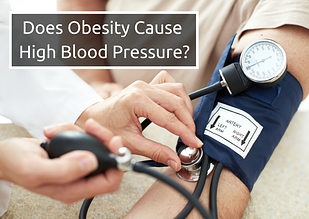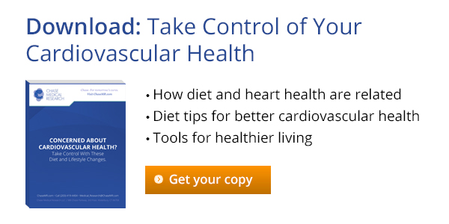Does being obese mean that you will automatically develop high blood pressure (hypertension)? The simple answer is “no.”
High blood pressure is commonly seen as an effect of being overweight, but the link between the two has yet to be determined. While we can identify risk factors related to both obesity and hypertension, a direct correlation between the two has yet to be proven.
It’s true that obese people are six times more likely to develop hypertension than those who are at a healthy weight. However, the true cause of high blood pressure is not just obesity, but rather medical conditions that are related to obesity, like diabetes and sleep apnea.
Hypertension Risk Factors 
Common risk factors for high blood pressure include genetics, age, diet and lifestyle. Any of these factors can cause hypertension in both overweight and healthy weight patients.
Here are a few factors that can increase your chance of developing high blood pressure -
- Age: Aging is a fact of life, and it also comes with an increased risk of hypertension. In fact, 65% of Americans over the age of 60 have high blood pressure. As a person gets older, their blood pressure tends to rise, so this is something you and your doctor should keep an eye on as you age.
- Gender: Gender also plays a role in the development of high blood pressure. Men are more at risk for high blood pressure up through age 45, while women are more likely to develop it after age 65.
- Genetics: Family history can also have an effect on blood pressure. Often times conditions that cause high blood pressure, like kidney disease, are passed down from generation to generation. Knowing your family history can help you take preventative measures against hypertension.
- Medication: Certain medications, like birth control pills or NSAIDs, can increase your blood pressure without you knowing. Be sure to fully understand the side effects of any medications that you may be taking. If you have concerns about medication increasing your blood pressure, speak with a pharmacist or prescribing physician to better understand your risks.
- Diet: Food high in fat, butter and cholesterol, sugar and salt may also to blame for hypertension. Limiting your intake of sodium can help prevent high blood pressure. Additionally, limiting or reducing your number of alcoholic beverages each day can lead to decreased blood pressure.
- Lifestyle: Lifestyle factors like high stress can lead to hypertension. When faced with a stressful situation, the body reacts by increasing your blood pressure. If you're under a constant state of stress, there is potential for your blood pressure to be elevated for a long period of time.
Prevent High Blood Pressure
No matter your weight, it’s important to realize that hypertension can put you at a greater risk for cardiac problems like heart disease, heart attacks, and stroke. In fact, heart disease is the leading cause of death in the United States.
If you’re uncertain about whether you have hypertension, or are at risk for developing it, see your doctor as soon as possible to determine your risks and to take steps to control it for a longer, healthier life.
If you're interested in learning more about your cardiovascular health, download our free white paper. Our white paper covers many cardiovascular risks and steps you can take to prevent them. To download, click the button below -
Share This Post
Recent Posts
- Understanding Body Mass Index (BMI) January 9 2015
- Obesity and Weight Management January 9 2015
- Relationship Between Obesity & Cardiovascular Disease January 9 2015
- What to Know About Vaccines January 9 2015
- What is Blood Pressure & What do Your Numbers Mean? A Quick Refresher. January 9 2015
Categories
- Clinical Trials
- Cardiovascular Disease
- Diabetes
- Obesity
- Kidney Disease
- Pain Management
- Female Sexual Dysfunction
- Migraine
- Vaccine
- Chronic Obstructive Pulmonary Disease
- Osteoarthritis
- Biologics
- COVID-19
- Diabetic Peripheral Neuropathy
- Gastroesophageal Reflux Disease
- Hypertension
- Irritable Bowel Syndrome with Constipation
- Lyme Disease
- Nonalcoholic Steatohepatitis
- Respiratory Syncytial Virus



